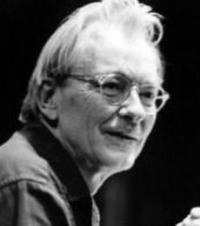|
Скачать ноты 
`Нетерпимость 1960` — пробуждение гуманистического сознания человека (шахтёра-эмигранта), который, взбунтовавшись против нужды, ищет смысл и «гуманную» основу жизни. Пережив испытания ненавистью и...Читать дальше
`Нетерпимость 1960` — пробуждение гуманистического сознания человека (шахтёра-эмигранта), который, взбунтовавшись против нужды, ищет смысл и «гуманную» основу жизни. Пережив испытания ненавистью и насилием, он вновь находит связь между собой и такими же, как и он, людьми и вместе с ними гибнет в наводнении. (Луиджи Ноно)
Х Свернуть 
Soloists - David Rampy (tenor), Urszula Koszut (soprano), Kathryn Harries (soprano), Jerrold van der Schaaf (tenor), Wolfgang Probst (bass-baritone). Chor der Staatsoper Stuttgart, chorus master Ulrich Eistert. Orchestra Staatsorchester Stuttgart, сonductor Bernhard Kontarsky. Запись 1993 г.
|
||





01. Opening Chorus: Lebendig Ist, Wer Wach Bleibt - Chor
In Einem Bergarbeiterdorf (In Un Paese Di Minatory) A Mining Community - Dans Un Pays De
Mineurs
Scene 1
02. Seit Jahren Verzehrt Mich Die Sehnsucht Zuruckzukehren In Mein Heimatland -
Fluchtling, Chor Der Bergarbeiter
Scene 2
03. Bleibe! Bleibe! Bleibe! - Frau, Fluchtling, Chor Der Bergarbeiter
Scene 3: A City - A Great Demonstration By The People
04. No Pasaran! Morte Al Fascismo! - Chor Der Demonstranten
Scene 4: A Police Station
05. Dein Name? Sprich! - 4 Gendarmen, Fluchtling, Frau, Stimme Von Alleg
Scene 5: The Torture
06. Die Paras Der Herrschenden Foltern - Chor Der Gefolterten, Stimme Von Sartre
Scene 6: A Concentration Camp
07. Auf Die Felder, Den Horizont - Chor Der Gefangenen, 4 Gendarmen, Gefolterter,
Fluchtling, Algerier
Scene 7: After The Escape From The Concentration Camp
08. Zusammen Widerstanden Wir Dem Wahnsinn - Fluchtling, Algerier
09. Poltert Auf Platze Den Marsch Der Emporung - Chor Der Algerier Und Fluchtlinge
Part Two
Scene 2*: Meeting Of A Migrant And His Woman Companion
10. Nie! Nie! Nie! - Gefahrtin, Fluchtling
Scene 3: Projections Of Episodes Of Violence And Fanaticism
11. Bist Du Nicht Mehr Allein? - Frau, Fluchtling, Gefahrtin, Chor Der Fluchtlinge Und
Gefahrten
Scene 4: Near A Village, By A Great River In Spate
12. Jenseits Des Stromes An Dem Ort, Wo Ich Traumte, Liegt Mein Heimatland - Fluchtling,
Gefahrtin, Chor Der Bauern, Sprecher
13. Closing Chorus: Ihr Die Ihr Auftauchen Werdet Aus Der Flut - Chor
Scene 1 Without Music*
``Intolleranza`` — ``Нетерпимость`` — опера Ноно, написана в 1960 году. Есть вариант 1970
года: ``Нетерпимость 1970``. Композитор комментировал:
``Нетерпимость 1960`` — пробуждение гуманистического сознания человека
(шахтёра-эмигранта), который, взбунтовавшись против нужды, ищет смысл и ``гуманную``
основу жизни. Пережив испытания ненавистью и насилием, он вновь находит связь между собой
и такими же, как и он, людьми и вместе с ними гибнет в наводнении.
В опере также использованы фрагменты из ``Репортажа с петлёй на шее`` Ю. Фучика, писем
казнённых участников Сопротивления, ``Левого марша`` Маяковского, поэмы ``К потомкам`` Б.
Брехта.
Следует отметить, что в этой опере намечены тенденции будущих сочинений, в том числе
опер: записанная на пленку музыка (в данном случае — хоры) транслируется через
репродукторы, помещённых в разных точках зала.
and Urszula Koszut as refugees, among others, with Chor der Staatsoper Stuttgart and
Staatsorchester Stuttgart conducted by Bernhard Kontarsky. Premiered as `Intolleranza
1960` and later revised as `Intolleranza 1970,` this is Nono`s first opera. Its premiere
was an internationally reported scandal (even Time magazine gave the event a full page)
similar to that of other groundbreaking works, with people attempting to shout down the
musicians and political leaflets raining from the upper balconies. Some of the protest
related to Nono`s membership in the Italian Communist party, and had little to do with the
opera itself. In fact, the text attacks segregation, the atomic bomb, and Nazism,
concluding with a plea to prevent civilization from destruction. Like D.W. Griffith`s
famous movie epic of the same name with its widely ranging historical periods, Nono`s
opera journeys through a vast
contemporary scene, drawing from European history but applicable worldwide. The cast
includes the two refugees as well as demonstrators, police, Algerians, farmers, miners,
torturers, and fanatics. Additionally, a scene focusing on `some absurdities of
contemporary life` includes projections, voices, magnetic tape, and mimes. The colorful
and pointillistic orchestral music is brilliant and dramatic, giving full rein to Nono`s
techniques of dividing and overlapping the text syllables to create new dimensions of
meaning. Nono has written that the opera concerns `the wakening of human awareness in a
man who has rebelled against the demands of necessity.and searches for a reason and a
`human` basis for life.` Although experiencing intolerance and domination before being
`swept away in a flood with other people,` he remains certain of `a time when man will be
a help to man.` `Symbol? Reportage? Fantasy?` Nono asks. `All three, in a story of our
time.`
`Пережив испытания ненавистью и насилием, он вновь находит связь между собой и такими же,
как и он, людьми и вместе с ними гибнет в наводнении`
полемика идёт явно с берговским `Воццеком`.